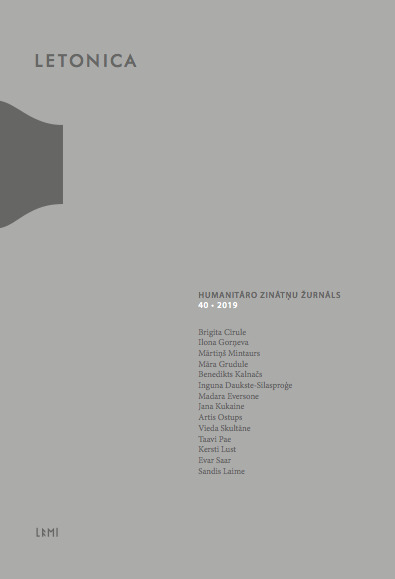Antīkā teorētiskā doma un pilsētas slavinājums: recepcijas aspekti Bazilija Plīnija poēmā "Slavas dziesma Rīgai"
Ancient Theoretical Thought and City Encomium: Aspects of Reception in Basilius Plinius’ Poem "The Encomium to Riga"
Author(s): Brigita Cīrule, Ilona GorņevaSubject(s): Literary Texts, Studies of Literature, Ancient World, Comparative Study of Literature, 16th Century, Theory of Literature
Published by: Latvijas Universitātes Literatūras, folkloras un mākslas institūts
Keywords: city encomium; ancient theoretical texts; Menander Rhetor; reception; Basilius Plinius’ poem "The Encomium to Riga";
Summary/Abstract: In ancient theoretical thought, a great deal of attention is devoted to the guidelines that should be applied when composing an encomium. This fact is not surprising since the encomium tends to mark the crucial points in the life of a society as well as the individual by perpetuating them to a certain extent and thus making known to future generations. Among encomia, city encomium, which according to the propositions of ancient theoreticians can be devoted to people, gods, places and things, is particularly distinguished. Ancient theoretical thought generalizes and discloses the issues, which might be expected from the city encomium, possibly providing an insight also into those ancient texts, which have not survived. Thus, the intention of the article is to consider the most essential characteristics of the city encomium as they are reflected in both ancient theoretical thought and its reception by using the poem “The Encomium to Riga” written by the 16th century Riga humanist Basilius Plinius and first published in 1595 as an example. The poem belongs to neo-Latin texts, which are distinctive for their conscious return to classical standards and theoretical as well as literary models. City laudation or encomium belongs to neo- Latin poetry texts particularly popular among poets-humanists in Europe up to the 17th century. Ancient theoretical thought in the context of city laudation is rather consequent in the distinction of the following three aspects: city foundation or growth, achievements of its citizens and geographical placement of the city. These aspects are touched upon already by Roman author Quintilianus (1st cent. AD); however, the theoretician writing treatises in the Greek language Menander Rhetor (2nd–3rd cent. AD) develops these aspects and discloses them in more depth. In the poem “The Encomium to Riga” by Basilius Plinius, these aspects of city laudation achieve artistic expansion disclosing the best qualities of the Livonian metropolis Riga and its citizens, as well as allow for an obvious evaluation of the continuity and reception of the tradition. The propositions found in ancient texts have not lost their topicality. Time periods and the respective situations are subject to changes but the basic propositions that guide of the creation of the city encomium remain and acquire creative development in conformity with the peculiarities of the time period. Furthermore, they provide a tangible sensation of a city as a metropolis of high-achieving citizens.
Journal: Letonica
- Issue Year: 2019
- Issue No: 40
- Page Range: 7-25
- Page Count: 19
- Language: Latvian

